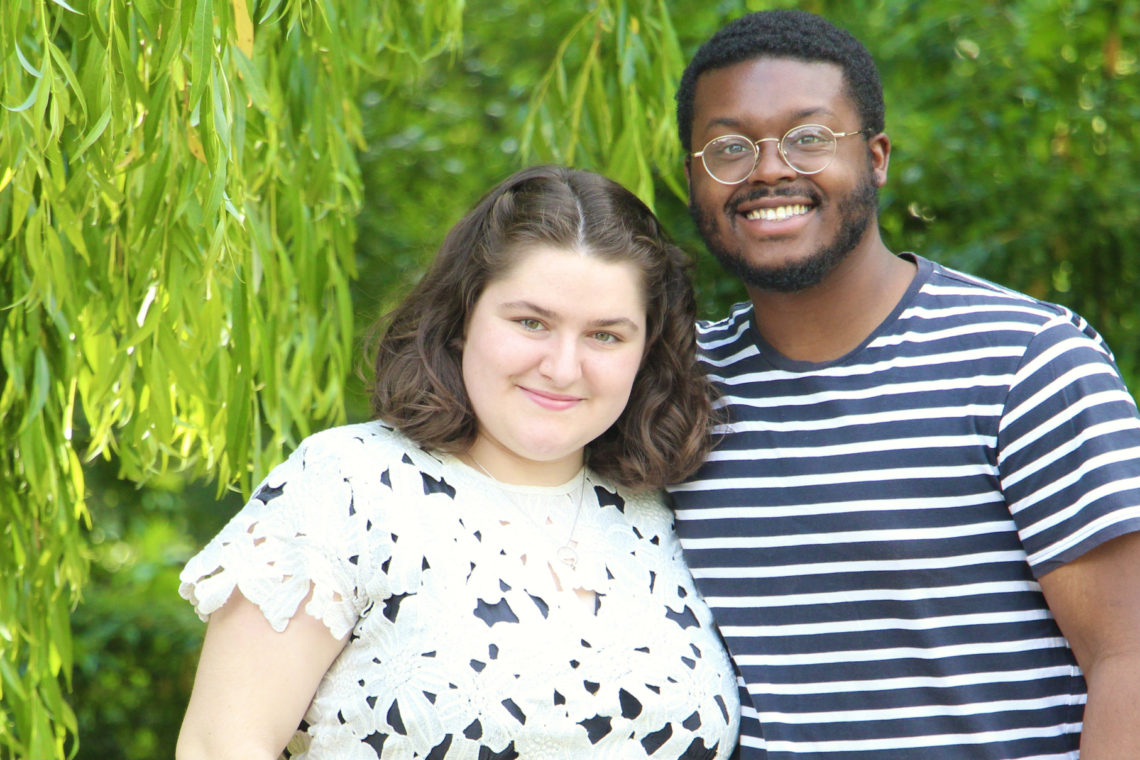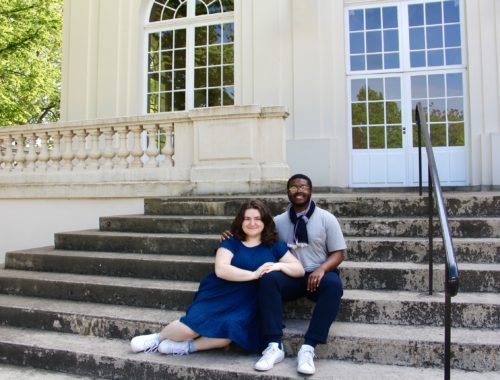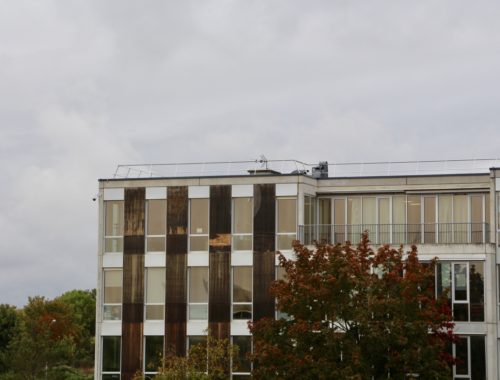
Studying in France as Americans: Finished with Year One of our Master’s Degrees
Believe it or not, Jalen and I have finished the first year of our master’s degrees at the Université de Reims Champagne-Ardenne, meaning that we officially have a Master 1 in Logistics and Public Law respectively! Keep reading for the details of what we did during the past month.
We spent the majority of the month of May focused on schoolwork. I devoted all of my time studying for and taking two written and five oral exams. In all honesty, the stress, anxiety, and pressure to succeed became really overwhelming for me in the weeks leading up to my exams. It’s during demanding times like this that I am most keenly aware of how difficult the educational path I chose really is. Studying French, European, and International Law in my second language without an undergraduate degree in law is extremely challenging!
Jalen‘s main academic focus this month was his rapport de stage, or internship report. This assignment is standard for students completing an internship during their studies in France and consists of an in-depth summary and critical analysis of the intern’s working experience. With only 8 weeks to write a 30-to-40-page report while simultaneously working full time, Jalen worked hard every evening to get it completed.
After a year of navigating school in France as Americans and putting in many hours of diligent work, we are both so excited and relieved to have passed. Jalen finished with an average of 12,8/20 and a mention assez bien (with honors) and I ended my year with an average of 15/20 and a mention bien (with high honors). While Jalen will continue to work his internship through the summer, we are glad that our schoolwork is all done for the time being.
Since our school year is over, we’ve finally got a bit of free time to occupy! We’ve been enjoying the warmer weather by eating outside at restaurants and going on walks in Reims. However, we’re still getting used to the lack of air conditioning coupled with the rising temperatures!
Thankfully, we were finally able to get our first dose of the COVID-19 vaccine this month. Neither of us experienced any negative side effects besides a sore arm for a few days, and we are looking forward to being fully vaccinated soon. As COVID-19 restrictions loosen in France, including curfew being pushed from 9:00 PM to 11:00 PM and a partial opening of the French border, we are hopeful that infections will continue to decrease here and around the world.
Thank you to all who have followed our journey throughout this school year, and we hope you’ll stick around! If you have any questions or want to know more, leave us a comment down below!
Check out this month’s update video!
Check out our other monthly updates!
- September 2020
- October 2020
- November 2020
- December 2020
- January 2021
- February 2021
- March 2021
- April 2021
- June 2021
- July 2021
- August 2021
- September 2021
- October 2021
- November 2021
- December 2021
- January 2022
- February 2022
- March 2022
- April 2022
- May 2022
- June 2022
- July 2022
- August 2022
- September & October 2022
Check out our video about our daily life as students in France!
You May Also Like

Studying in France as Americans: Fun Local Events and Laser Focus
May 25, 2022
A Candid Review of Year Two in French Graduate School
October 19, 2022


11 Comments
Andrea
Félécitations pour vos bonnes notes. Profitez du temps libre.
Jalen & Maria
Merci, Andrea ! Justement, nous comptons faire ça !
Michelle
Congratulations Maria and Jalen! I appreciate the time and effort you put into sharing your updates – especially while pursuing your Masters degrees at the same time! Please keep up the good work and continue sharing.
Jalen & Maria
Thank you! It takes a lot of planning and effort to keep up with our blog and YouTube channel, but comments like these make it worth it.
Alexis
Salut!
Firstly, thank you to Maria for sending me the link on how to become a lawyer in France, I really appreciated it! I’m writing to both of you this time because I was wondering if you ever felt insecure about being (maybe) older than other students in your program? (I am not aware of the average age of a M1 student so I know that I could be totally wrong in thinking that you are older than your classmates).
I’m thinking of doing TAPIF for a year before I pursue my postgraduate studies, whether I end up in France or in another country, but I am hesitant to do so because I feel like I should get my postgraduate studies done now before anything else. I also have this weird thing with being the oldest one in the group.
Merci!
Alexis
Jalen & Maria
Hello again!
French undergraduate degrees are typically three years long, making 21 the “normal age” of a first-year master’s degree student. After completing four-year undergraduate degrees in the United States and spending a year as teaching assistants with TAPIF, we were both a few years older than the “normal age.”
However, we never felt insecure about the age differences between us and our classmates. Additionally, we were not the oldest students in our programs! Age was not really a topic of conversation, and nobody in our programs made anyone else feel badly about their age.
Having done TAPIF ourselves, we would absolutely recommend it as a stepping stone to pursuing postgraduate education in France. Firstly, you’ll get a taste of living independently in France while also benefiting from the support of a professeur référent and having a steady income to rely on. Furthermore, you’ll get a chance to do administrative tasks like setting up a bank account, getting your carte vitale, and learning how to rent a place to live in France while working part time instead of having to do these things while studying full time.
That being said, only you know if taking a year to participate in TAPIF is right for you and how much being an “older” student might affect you personally. We wish you good luck with this important decision.
If you’d like more information about our TAPIF and master’s degree experiences, we recommend watching our TAPIF playlist and our master’s degree playlist. All the best!
Lisa Fleury
Congratulations to you both on your stellar results! I had not read or seen your June article and video. This is quite an accomplishment for you both. Enjoy your well deserved summer (even though Jalen is working, hopefully you can both find some down time.) Maria, if you ever feel that level of stress again, I hope you can find some support and coping techniques. Maybe take thus time when things are good to prepare for the inevitable stressful moments.
Yoga? Breathing? Sophrology? Keep up the good work both of you. If you come to Paris, let me know.
Jalen & Maria
Thank you for your support.
Maurice
I can’t thank you enough, Jalen and Maria, for creating this safe space for us. You are truly our heros.
Could you talk more about how you managed during your TD classes, the ones where you had to interact with other native French speakers ? Were you nervous? How did you handle not being able to understand classmates when working in group assignments? How did you handle giving presentations in front of large groups???
I ask because I’m really trying to pinpoint which parts of your university experience really allowed you to make the greatest gains with your French.
In my case, my goal is to work as a television commentator, or even an interpreter. So, I’m looking to push myself linguistically in every aspect.
Currently, I’m considering two options. Either the DU (Diplôme Universitaire) or a full-fledged 2-year Master’s degree.
Let’s look at a DU at Paris-8, first. (Here’s the link: http://www.fp.univ-paris8.fr/formation-lutte-racisme-antisemitisme)
As you can see, for the D.U., it only meets on Wednesdays from 3 p.m. to 6 p.m., and it runs from October to the 1st of June. If I were to go this route, I could use my free time to take FLE classes, allowing me to ask questions until I’m blue in the face.
Now, let’s look at the master’s degree option. A) You have class almost everyday; B) it comes with an internship; and c) you have more contact with native speakers, and the language in general, for better or worse, but not always able to ask those burning language questions.
Now, the big question: which path would you take if you wanted to truly elevate your French language skills: The D.U. or the Master’s degree?
Je parle français couramment (~B2).
Thanks so much and I look forward to your insight.
Maurice
Jalen & Maria
We are so glad you find our blog to be helpful.
In all honesty, handling our TD classes, interacting with classmates, and giving presentations were no more stressful than what we experienced during our undergraduate degrees in the United States. Besides the occasional “Could you repeat that?” we have never had any serious problems understanding our classmates. Because we are confident in our French and rigorous in our academic pursuits, the only nerves we felt were the run-of-the-mill jitters that most people feel before important presentations.
Based solely on how often you would use your French, it would seem that the master’s degree would give you the most opportunities to hone your French skills.
However, in our (non-professional) opinions, you should base your choice on more than just this factor.
For example, a DU is not a nationally-recognized diploma, whereas a Master is. Furthermore, a DU doesn’t lead to the same career opportunities as a Master could. A DU is considered an “extra” or a “plus” and not as a qualification in and of itself in France. You’ll have to consider which degree responds to the majority of your needs when making your decision.
Hope this helps a bit.
Maurice
Indeed! This helps a great deal.
Thank you particularly for highlighting the distinction between a D.U. and a Master’s degree.
You really put your finger on the pulse of the situation and articulated the clear differences, thereby helping me to make a more informed decision.
Can’t thank you enough.